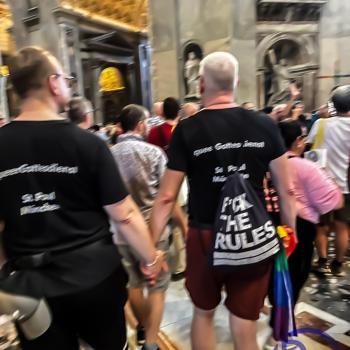
In the last article posted on this blog, Peter (Pilgrim) offered a critical assessment of the Act of Reparation conducted by four traditionalist bishops in response to the sacrilege that occurred when a group of LGBTQ pilgrims and activists staged public demonstrations calling for greater inclusion in the Church.
The group entered several significant religious sites, including the Church of the Gesù and St. Peter’s Basilica, carrying rainbow-colored crosses and wearing T-shirts with slogans considered profane and irreverent. According to reports and photographs circulating online, one shirt read, “Fu*k the Rules.”
In response, Bishops Athanasius Schneider, Marian Eleganti, Robert Mutsaerts, and Joseph Strickland performed a public Act of Reparation at the Catholic Identity Conference in Pittsburgh on October 4, 2025. As Peter rightly points out, both groups staged “performative protests” against each other—one in defiance of Church teaching, the other in defense of it.
My purpose here is not to rehash what Peter wrote but to address what remains missing: Where is the Vatican’s response? Some believe the Vatican’s silence reflects prudence and careful reflection. Others believe any statement condemning the LGBTQ demonstrations would expose weakness and easy manipulation.
I argue that inaction itself reveals weakness and proves that manipulation has already occurred. The hierarchy, desperate to avoid appearing mean, insensitive, or bullying toward a marginalized group, remains silent. Why? Because in today’s culture, even a pastoral affirmation of Church teaching marks one as cruel and intolerant. And cruel, intolerant people make poor companions on the path of “accompaniment.”
The Tyranny of Perception – Who Decides What’s “Mean”?
What does the word mean even signify—and who decides when someone fits that label? People often define it subjectively, usually when they feel offended by a truth they do not want to hear. Those who resist correction quickly brand the messenger a bully.
But what of Christ’s supposed “meanness”?
- He rebuked the Pharisees as “hypocrites,” “blind guides,” and “whitewashed tombs” (Matthew 23:13–36).
- He cleansed the Temple and accused the merchants of turning His Father’s house into “a den of robbers” (Matthew 21:12–13).
- He confronted the adulterous woman’s sin and commanded her, “Go, and sin no more” (John 8:3–11).
By modern standards, these actions appear harsh or unpastoral. Yet Christ acted out of mercy to awaken hardened hearts. His zeal in the Temple defended holiness, not His reputation. He loved the adulterous woman enough to tell her the truth. Christ never sought reputational safety; He confronted sin in love, even when that confrontation led to hatred and crucifixion.
The Prophets – Truth-Tellers Misread as Troublemakers
The Old Testament prophets endured the same hostility for exposing sin.
- Elijah faced King Ahab’s accusation: “Is it you, you troubler of Israel?” (1 Kings 18:17–18).
- Jeremiah suffered imprisonment for warning Jerusalem of destruction; officials branded him a traitor and threw him into a cistern (Jeremiah 38:4–6).
- Amos endured banishment from the land for condemning injustice (Amos 7:12–13).
Kings expelled prophets from their courts. Religious leaders mocked them. Their audiences mistook compassion for cruelty. In every age, truth-tellers earn scorn until history vindicates them. Their courage cost them comfort, reputation, and often their lives.
Comfort as the New Gospel – When False Mercy Replaces Truth
Today many Church leaders bow to cultural pressure that prizes emotional comfort over moral conversion. Causing offense now appears worse than committing sin. Clergy and laity alike fear sounding judgmental, so they speak softly—or not at all—when the times demand boldness.
This silence turns pastoral accompaniment into pastoral paralysis. When the Vatican ignores open sacrilege, it sends the message that emotional comfort outranks fidelity to the Gospel.
Christ teaches otherwise. In John 8:11, He offers mercy by exposing sin, not concealing it. Real mercy heals, false mercy hides. Christ united both truth and tenderness when He said, “Go and sin no more.” His words carried both absolution and a call to conversion.
Final Thoughts – The Courage to Be Called “Mean”
The Church once converted empires because she spoke the truth without fear. She now risks irrelevance because too many leaders fear speaking at all. Christ transformed sinners rather than affirming them. The prophets confronted corruption rather than promising false peace. Their courage changed history because they loved souls more than comfort.
When Church leaders refuse to correct sin out of fear of appearing manipulative, they prove that manipulation has already succeeded. The hierarchy now strives to appear agreeable—a nice partner in the world’s version of accompaniment. Calling out sin, even blatant sacrilege, now seems “mean.” And so, the Church falls silent.
The saints did not conquer by silence. They conquered by truth. The world does not need a Church that flatters its sensitivities; it needs a Church that calls all to sanctity.
*** Some will reply that the Church does speak against sin—against racism, greed, environmental neglect, and hostility toward migrants. I do not deny that these are moral evils worthy of condemnation. Yet those are safe condemnations, because the secular world applauds them. The harder test of fidelity lies in calling out the sins the world celebrates: sexual immorality, sacrilege, and the profanation of what is holy. On those, too many shepherds now remain silent.
Thank you!
Read The Latin Right’s other writing here.
Please visit my Facebook page and IM your questions (and follow my page) or topics for articles you would like covered.













